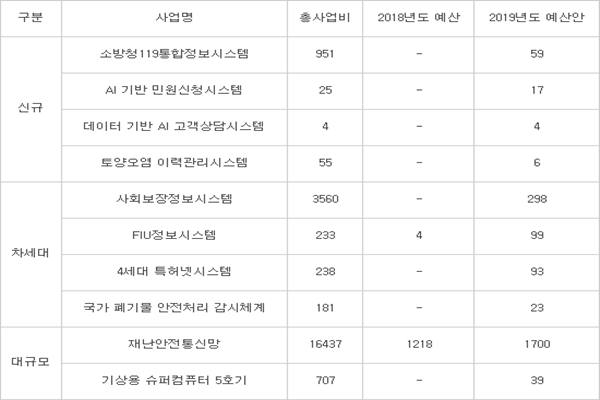South Korean Government is going to invest $3.25 billion (3.61 trillion KRW) into its central government information-oriented business in 2019 which is 7.8% more than this year’s investment. Size of this spending is the highest since 2006 when it spent $3.08 billion (3.43 trillion KRW).
New projects such as AI (Artificial Intelligence) system that responds to inquiries regarding military service and national pension and ‘National Fire Agency 119 Comprehensive Information System’ that communicates in real-time when there is huge fire stand out. For second stage of building national disaster communication network, it is going to invest $153 million (170 billion KRW).
According to South Korean Government, Ministry of Economy and Finance (MOEF) formed $3.25 billion (3.6090 trillion KRW) of budget for ‘central government information-oriented business (excluding national defense’s information-oriented business due to confidentiality)’ within 2019 budget plan submitted to The National Assembly.
This budget is $234 million (260.4 billion KRW) more than this year’s budget at $3.01 billion (3.3487 trillion KRW). Size of spending, increase rate, and size of increase are all the most ever since 2006. Budget for central government information-oriented business had been going down since it reached its peak in 2006 and it has started to go up again since 2017.
It is estimated that budget for information-oriented business from national perspective will be around $5.4 billion (6 trillion KRW). Budget for this year announced by Ministry of Science and ICT at the end of last year was $4.71 billion (5.2347 trillion KRW).
Next year’s new information-oriented businesses will be based on new technologies such as AI and Big Data.
Ministry of the Interior and Safety (MOIS) is going to set up an ‘AI-based civil complaint system’ to operate an interactive chatbot for consultations regarding military service. Simple guidance that corresponds to 71% of consultations regarding military service will be automated. Ministry of Health and Welfare (MOHW) is going to set up an intelligent consultation system that analyzes customers’ voice data through AI and increase quality of its consultation service.

Ministry of Environment (ME) is going to set up a new ‘ground pollution record management system’. It is looking to raise efficiency in managing ground pollution by managing Big Data on potential source of pollution and records on occurrence, investigation, and purification of scattered ground pollution. National Fire Agency (NFA) applied building of ‘National Fire Agency 119 Comprehensive Information System’, which allows real-time communication between scene, person in charge, NFA, and national crisis management center, to its new budget to effectively respond to huge fire early.
South Korean Government is also going to push for many projects that will establish next-generation information systems.
Financial Services Commission (FSC) is going to push for next-generation FIU’s (Financial Information Unit) information system and apply Big Data analysis method to effectively respond to different types of money laundering and enhance management on illegal financial transactions.
MOHW is going to set up a next-generation social security information system. It is going to simplify application procedure by using online and mobile methods and it is going to check qualifications of supply and demand every month.
Set-up of national disaster communication network and introduction of Super-Computer Unit 5 stand out from large-scale information-oriented projects.
MOIS is going to invest $153 million (170 billion KRW) into national disaster communication network set-up project in 2019 which is $43.3 million (48.2 billion KRW) more than this year’s budget at $110 million (121.8 billion KRW). While this project has focused on central part of South Korea this year, it will focus on southern part of South Korea in 2019 as part of second step of the project. Korea Meteorological Administration (KMA) is going to invest $3.51 million (3.9 billion KRW) into introducing Super-Computer Unit 5 that has 7 times better performance than Super-Computer Unit 4.
South Korean Government sees that next year’s budget on information-oriented businesses has risen drastically as innovative growth has emerged as an important task. It is expected that relevant industries will benefit from increase in number of public information-oriented projects that will be awarded.
“To be a leader of rapid changes of ICT (Information Communication Technology), we have decided to invest more into information-oriented businesses applied with new technologies such as Big Data, AI, and blockchain.” said a representative for MOEF. “South Korean Government will play a role of priming water for relevant markets.”
Staff Reporter Yoo, Seonil | ysi@etnews.com
